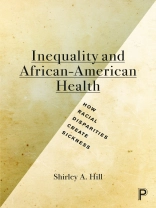This book shows how living in a highly racialized society affects health through multiple social contexts, including neighborhoods, personal and family relationships, and the medical system.
Black-white disparities in health, illness, and mortality have been widely documented, but most research has focused on single factors that produce and perpetuate those disparities, such as individual health behaviors and access to medical care.
This is the first book to offer a comprehensive perspective on health and sickness among African Americans, starting with an examination of how race has been historically constructed in the US and in the medical system and the resilience of racial ideologies and practices. Racial disparities in health reflect racial inequalities in living conditions, incarceration rates, family systems, and opportunities. These racial disparities often cut across social class boundaries and have gender-specific consequences.
Bringing together data from existing quantitative and qualitative research with new archival and interview data, this book advances research in the fields of families, race-ethnicity, and medical sociology.
Table of Content
Introduction
Part One: Theorizing Social Inequalities in Health
Race, Racism, and Sickness
Slavery and Freedom
Part Two: Health and Medicine
Health Behaviors in Social Context
Medical Care and Health Policy
Part Three: Health and Families
Economic Decline and Incarceration
Love, Sexuality and (Non)Marriage
Children’s Health
About the author
Professor Shirley Hill teaches courses on the family, medical sociology, social inequality, and qualitative methods at the University of Kansas. Her research examines the implications of social inequalities, especially those based on social class, gender, and race.












